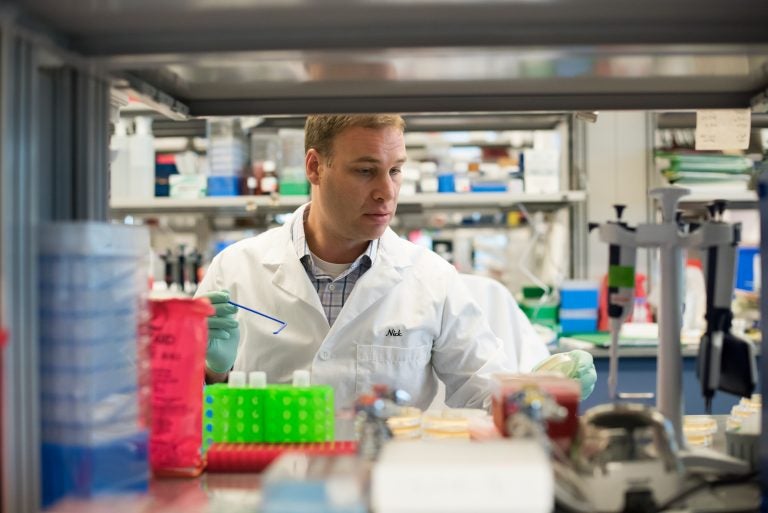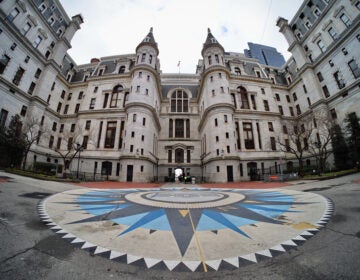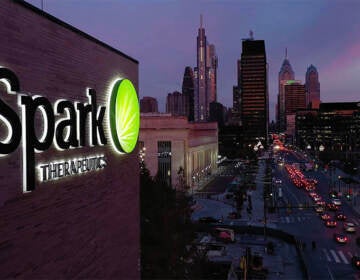Roche buying Philly’s Spark Therapeutics for $4.8 billion
Spark Therapeutics says being acquired by Roche will help it expand its gene therapy treatments while staying in Philadelphia.

A research scientist in the Spark Therapeutics laboratory (Spark Therapeutics)
The Philadelphia-based gene therapy company Spark Therapeutics says it is being acquired by the giant Swiss healthcare company Roche for $4.8 billion.
“With its worldwide reach and extensive resources, Roche will help us accelerate the development of more gene therapies for more patients for more diseases and further expedite our vision of a world where no life is limited by genetic disease,” said Jeffrey Marrazzo, chief executive officer of Spark Therapeutics. He is the son of WHYY CEO Bill Marrazzo.
Under the deal, Spark says it will operate as an independent company in the Roche Group.
Kevin Mahoney, executive vice president and chief administrative officer of Penn Medicine, says the deal — which will allow the company to remain in Philadelphia — is an exciting development for the life sciences industry here.
“This is very exciting for Children’s Hospital, for Penn, for the city, and most importantly for patients, because with more resources that Roche could bring, that’s more access to this life-changing drug that was invented to Philadelphia and will now be available to more patients across the globe,” Mahoney said.
Spark was founded by Marrazzo and Dr. Katherine High, emerging out of work at the Children’s Hospital of Philadelphia.
In December 2017, the FDA gave Spark the first approval for a gene therapy to treat an inherited disease. Its Luxturna therapy improves vision for patients with a rare form of blindness called Leber congenital amaurosis. It affects between 1,000 and 2,000 patients in the U.S.
Mahoney says the larger resources will be especially helpful in trying to manufacture the treatment for more patients.
“These are very sophisticated drugs that require unique manufacturing space and with the additional resources, my assumption is that Spark will be able to accelerate and make available not only Luxturna, but additional treatments, [including] hemophilia, to a broader swath of patients across the globe,” Mahoney said.
Yun Zhong watches several companies like Spark, as the director of biotechnology equity research at the financial services firm Janney Montgomery Scott. He says Spark is ahead of other biotech companies of its size and scale, because it already has a treatment approved by the FDA.
He adds that Roche bought Spark for more than twice its value as of the close of markets last Friday, which means investors are looking favorably at gene therapy companies and the biotech sector overall.
This is part of a recent trend of major drug companies buying or partnering with gene therapy companies. For example, the drug company Novartis bought the Illinois-based gene therapy company AveXis for $8.7 billion last year. In 2016, the drug company Pfizer bought Bamboo Therapeutics, a gene therapy company based in North Carolina. Zhong says this latest deal between Roche and Spark will not be the last time a major drug company buys a gene therapy company.
Kevin Mahoney of Penn Medicine says Philadelphia is uniquely placed to benefit from the growing biotech sector. He points out that the city is also the home of immunotherapy companies Tmunity and Carisma.
“There’s a plethora of startup companies all involved in cell and gene therapy, that we think is unique to Philadelphia and really can be cornerstone of an economic growth in Philadelphia,” he said. “We don’t need (Amazon’s) HQ2.”
Amber Salzman, president and CEO of the biotech company Ohana Biosciences, says Philadelphia does have two things going for it: research institutions like the University of Pennsylvania and the Children’s Hospital of Philadelphia, and a history of drug companies based here. She used to work for GlaxoSmithKline (GSK), which has long history in Philadelphia going back to 1830; Wyeth is headquartered in Collegeville and merged with Pfizer.
“I just came from running a (gene therapy) company in the Bay Area, and it was really difficult to find people who had just deep development experience given just there haven’t been that whole legacy that exists in Philly,” she said. “In Philly there’s just a lot of people that have put drugs on the market.”
However, Salzman adds there are also reasons why Philadelphia is not the thriving biotech hub that say, Boston, is.
“I’m one of many former GSK people that are working in the Boston area and I can tell you when I fly out on Monday morning it’s not infrequent where I run into former colleagues who are doing the commute.”
She says one limiting factor is access to lab space. She co-founded a company in Philadelphia, and needed lab space, which she got from the University City Science Center, but finding a lab can be a little challenging once the company has launched and has outgrown initial lab space.
“You don’t have the automatic structure that you have for example in the Boston area.”
But she says now the Philadelphia area has more and more local biotech companies, which starts to build critical mass.
“That’s why I think this Spark deal with Roche really helps in terms of the momentum and gives confidence that there will be a big innovative company local to this space, they’re investing in this space, they’re continuing to invest in this space.”
WHYY is your source for fact-based, in-depth journalism and information. As a nonprofit organization, we rely on financial support from readers like you. Please give today.





